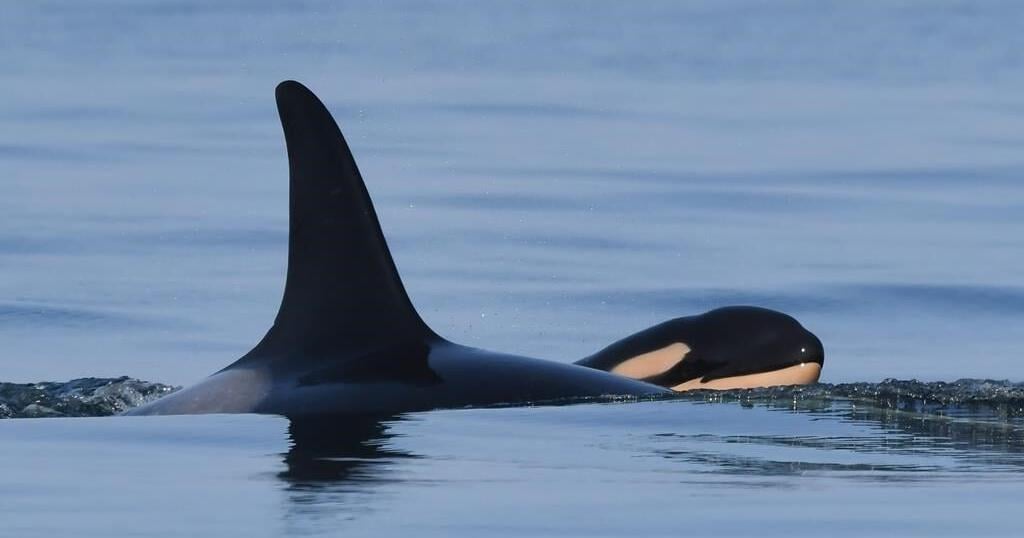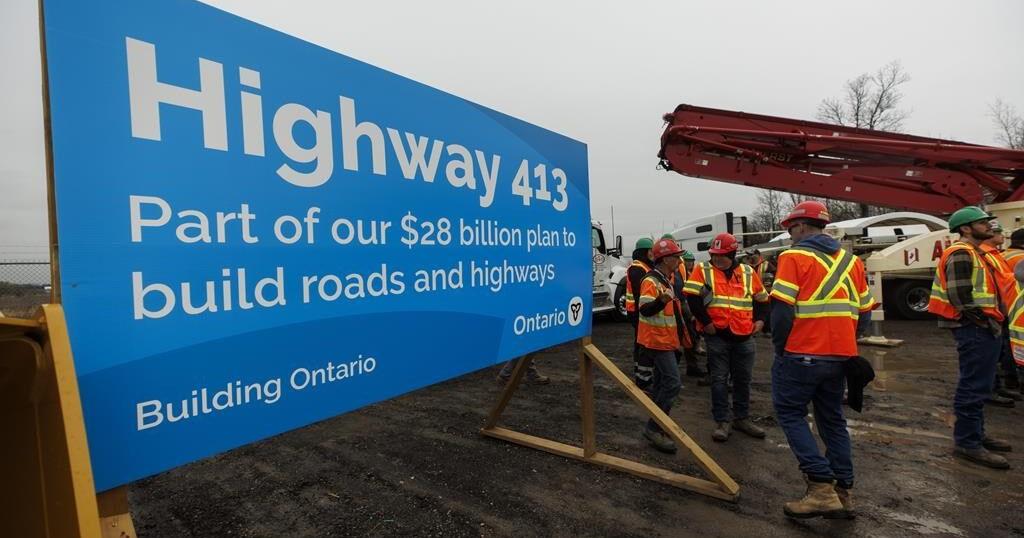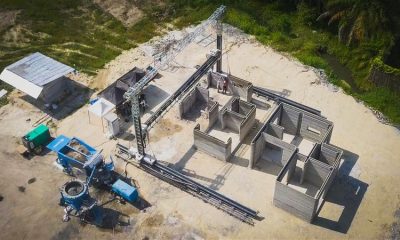The southern resident killer whale known as Tahlequah captured global sympathy in 2018 when she pushed the body of her dead calf for more than two weeks in waters off British Columbia’s south coast.
Some scientists and advocates called the scene a display of public grief.
But the impact of the loss went beyond Tahlequah. It was a significant blow to the entire population that numbers just 74 individuals.
Recent research suggests a baseline rate of population loss of roughly one per cent per year — based on modelling and 40 years of observations — putting the whales on a path toward a “period of accelerating decline that presages extinction.” Even that rate of loss is “optimistic,” the research says.
The study lends urgency to calls by a coalition of environmental groups for the Canadian government to reverse its decision not to issue an emergency protection order for the whales, in the face of what may otherwise be inexorable decline.
The top ocean predators are classified as endangered under Canadian and U.S. species-at-risk laws, which are meant to trigger protections. But the measures haven’t yielded any signs of recovery for the whales, says the coalition that includes the David Suzuki Foundation and the Raincoast Conservation Foundation, among others.
Misty MacDuffee, a conservation biologist with Raincoast, said the whales’ long potential lifespans may obscure their journey towards extinction — Parks Canada says a whale known as Granny was estimated to be 105 years old when she died, though that age has been disputed.
“We always have to remember that these are long-lived animals, and the population can be going extinct over decades simply because those animals are still alive,” said MacDuffee, a co-author of the recent study.
She said the research published in the journal Communications Earth & Environment in April shows “there is no possibility of recovery” for the southern residents under existing conditions in their habitat.
The study notes that in a population of 75 whales, “a single birth or death represents an annual population growth or decline of 1.4 per cent, underscoring the value of each individual in preventing the disappearance of a population.”
“It’s so down to the wire for these whales. Had we acted a decade ago … then we might not be in this situation. We’ve done very little,” MacDuffee said.
“The government is making decisions to say, ‘Well, the economics and these other objectives override the recovery of these whales.'”
As the threats pile up in the Salish Sea, the busy marine corridor off B.C.’s south coast where the southern residents feed on chinook salmon, scientists say the whales’ survival hangs by a thread.
‘IMMINENT THREATS’ TO SURVIVAL
The southern residents have come to symbolize the beauty and biodiversity of the region and carry special significance for Indigenous Peoples.
In Washington state, the Lummi Nation’s name for the orcas, “qwe lhol mechen,” means relatives below the waves.
They are also captivatingly complex.
MacDuffee pointed to Tahlequah’s behaviour as a kind of public mourning for her dead calf.
“She did it so publicly. She did a tour of the most high-profile waters. She didn’t go out, you know, off Swiftsure Bank,” said MacDuffee, referring to a site at the Pacific end of the Strait of Juan de Fuca. “She stayed right here and transited through Haro Strait, the Gulf Islands, Georgia Strait, just the most high-profile waters that she could be in.”
That complexity wasn’t always respected — the southern residents were depleted in the 1960s and 1970s by live captures for aquariums, and they’ve failed to recover since then. They do not interbreed with other orcas.
In 2018, Canadian officials had determined that the southern residents faced “imminent threats” to their survival and recovery. These included the availability of chinook salmon, as well as ship strikes, noise-related disturbances and environmental contaminants.
But Ottawa declined to issue an emergency order at the time, opting instead to update the pre-existing recovery strategy and pointing to existing measures and pledges, including seasonal fisheries closures, work to rebuild chinook stocks, and tools to alert vessels to the presence of whales.
MacDuffee said conditions have only worsened for the southern residents since then, with no signs of recovery despite government efforts and promises.
The conservation groups say existing measures aren’t yielding results, especially as more tankers have begun carrying petroleum products from the expanded Trans Mountain pipeline. Last year, Ottawa also approved plans for a new shipping container terminal near the mouth of the Fraser River.
The coalition’s demands include a prohibition on further increases in shipping traffic from new, federally approved industrial projects in the Salish Sea until Ottawa delivers a comprehensive plan to manage the cumulative effects of underwater disturbances.
The groups also want the federal government to increase the minimum distance vessel operators must stay away from whales to 1,000 metres, up from 400 metres; and to adopt “meaningful” underwater noise reduction targets.
An email from Fisheries and Oceans Canada said the department was “reviewing the petition to determine a path forward” while pointing to its existing efforts.
The federal government says it’s working on measures to address underwater noise and the risk of vessel strikes, updating federal marine oil-spill response requirements, and supporting Indigenous groups to monitor the cumulative effects of human activity.
Jeffery Young was part of the push for an emergency protection order in 2018. The senior scientist and policy analyst with the David Suzuki Foundation said B.C. environmental groups have been working with Ottawa for the last six years.
But Young said “we’re just not seeing any real benefits to the whales yet.”
He said it was the completion of the Trans Mountain pipeline expansion and increase in tanker traffic as well as the approval of the Roberts Bank Terminal 2 project that pushed the groups to renew their call for emergency protections.
“We were questioning whether the government was really, in any way, holding up its side of the bargain with respect to recovering these whales,” Young said.
The federal review panel report for the terminal project shows it involves the destruction of 177 hectares of aquatic habitat to make way for a new three-berth container terminal near the existing port infrastructure in Delta, south of Vancouver.
It says the terminal would have “significant adverse and cumulative effects” on juvenile chinook and the southern residents that rely on them, and adds that “a lethal vessel strike on a single (whale)” could seriously affect the population overall.
Environment Minister Steven Guilbeault signed the approval for the project in April 2023, saying it was “likely to cause significant adverse environmental effects,” but those harms were “justified in the circumstances.”
Raincoast and the David Suzuki Foundation are among the groups challenging the project’s approval in B.C. Supreme Court, arguing its effects cannot be justifiedunder environmental assessment law while sidestepping the Species at Risk Act.
On top of that, Young said science had emerged about the locations of key feeding areas that should be off-limits for any chinook fisheries. He said government scientists were involved in that research, but the findings aren’t fully reflected in the government’s existing fisheries measures.
“Some of our concern in the processes over the last six years is that those scientists haven’t been playing as central a role in really defining the government’s approach. It’s been much more a political exercise,” he said in an interview.
The paper MacDuffee co-authored says the whales’ survival is contingent on conditions improving in the Salish Sea, not staying the same or getting worse.
It says population dynamics over four decades predicted annual decline of about one per cent continuing gradually for about two generations before a “accelerating decline” and extinction.
But the researchers write that threats are expected to worsen in the future, particularly when it comes to declining chinook.
“We predict that prey-mediated changes in (the southern residents’) survival and reproduction are likely to lead to even more dramatic declines in the coming decades than the prior baseline model suggests,” the paper says.
The researchers conclude that recovery is possible, but greater action must be taken right away to give the southern residents a fighting chance.
While no single scenario can help the whales reach a U.S. recovery target of 2.3 per cent annual growth, they write that “concerted efforts” could reverse the decline and potentially help the orcas reach an annual recovery rate of one per cent.
“If recovery is a goal and we have an endangered species law to protect endangered species because that’s what Canadians value, then they shouldn’t be able to just dismiss this,” MacDuffee said, adding the whales are an “umbrella species” whose health is an indicator for the health of the Salish Sea overall.
“If the whales can still be here, we can still hold on to all these other aspects of this unravelling ecosystem.”
This report by The Canadian Press was first published July 25, 2024.
























